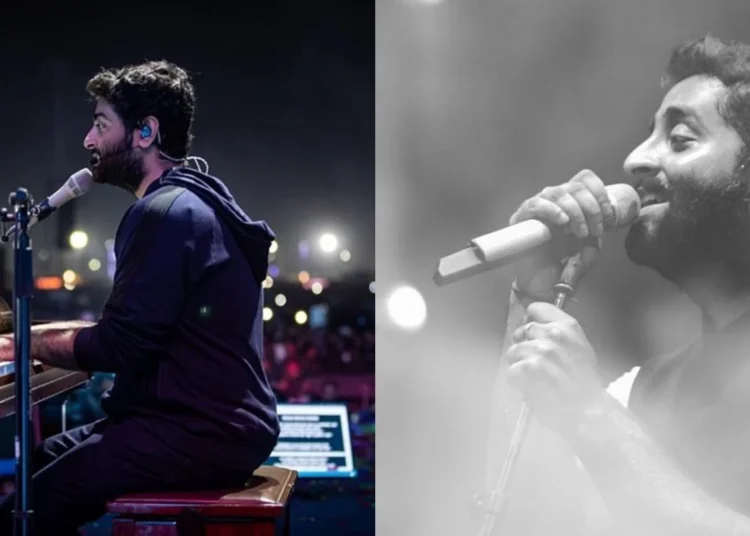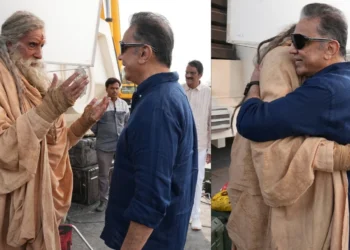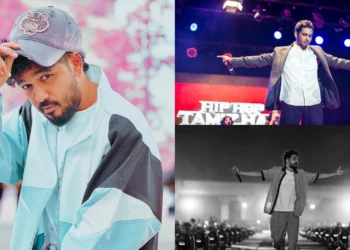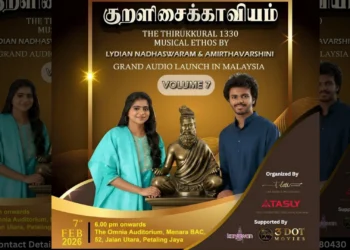Esaki character in Devar Magan is what Maamannan is about. What if Esaki becomes Maamannan?
– Mari Selvaraj, director of up the upcoming film, Maamannan
Mari Selvaraj has etched his own name in Tamil cinema history. His films, on par with Pa. Ranjith’s, have subverted and questioned the culture that Tamil cinema has represented all along. Mari Selvaraj’s debut film, Pariyerum Perumal, is a significant work on a young man’s life and the casteist, dystopic world around him. Karnan, Mari’s second film, had a similar theme, but Karnan believed in revolutionary violence. Karnan took up arms to defend and liberate his people. Mari’s films so far have all dealt with subverting the way cinema has depicted the oppressed castes in its caste-feudal lens, never seeing them as complete people with a culture, history, and philosophy.
A.R. Rahman has brought out Mari Selvaraj’s politics and ideology brilliantly in this album. He also has his own musical interpretation of the filmmaker’s aesthetic and philosophy. Some of the songs, particularly those that follow the Oppari and Nattupura (folk) traditions, call back to the Rahman Era of Rasathi (from Thiruda Thiruda) and Kizhakku Cheemayile.
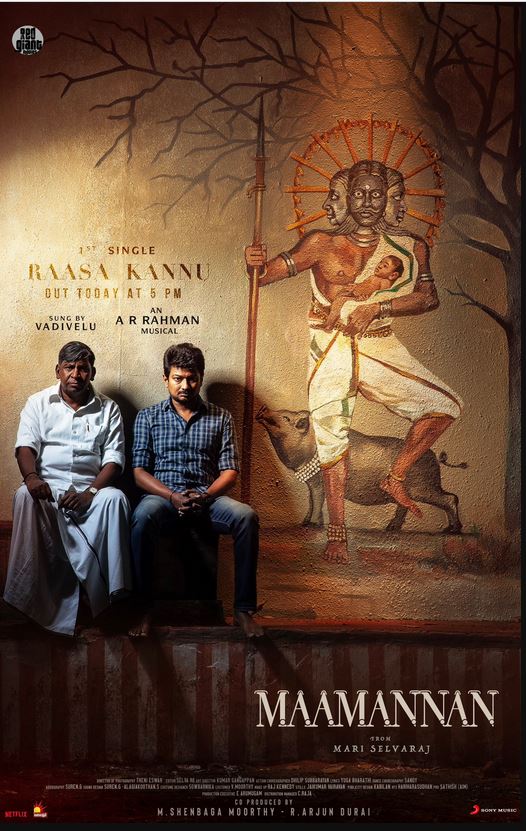
Kodi Parakura Kaalam

The album opens with this revolutionary call for battle. The song of a broken, docile woman calling out for her lover in her trapped, abandoned state. She mourns the loss of her Ondiveeran, but a brave woman comes along and tells her, Inga Ondiveeran Nee Than Di! She demands the other woman arm herself, brace herself before the world, and forge her own path. The use of the historical figure Ondiveeran here is notably important. Ondiveeran was an anti-imperialist warrior who fought against the East India Company, the British imperialist economic instrument used to colonise Tamil Nadu. He was also from a subjugated caste. The memory of Ondiveeran is kept alive not only as an emblem against imperialism but also as a revolutionary struggle against caste-feudalism. Most Tamil cinema has two women singing about romance, but these women sing for revolution. The might of brave Ondiveeran lives through us all. The Kodi that flies here is the flag of liberation. The flag of resistance to the Old World of enslavement.
Nenjame Nenjame

Arguably the weakest song in the album, Nenjame Nenjame doesn’t have the intended impact of a love song. It’s a shame because everybody involved in this romantic song has talent way beyond what this song has produced. From A.R. Rahman to Vijay Yesudas to Shakthisree Gopalan to lyricist Yugabharathi, all of who have made mesmerising romantic works, have failed to entrance me in this particular ballad. The lyricism is no doubt intimate on its own, but in the form of a song, the depth and beauty of the poetics do not entrance the listener.
Utchanthala
Just as the song is titled, you can feel this mournful ballad seep from the top of your scalp deep into the flesh and marrow of your spine. The song makes one come face-to-face with death and loss; it’s ominous, haunting, and eerie. The voices of Deepthi Suresh, Sireesha Bhaguvatula, and Pavithra Chari, sink deep into our souls and leave us grasping for air, as if space has suddenly collapsed all around us. There are very few instruments in this masterful song, and the annihilating lyrics and harrowing vocals drag us to a form of abyss. Yugabharathi’s lyrics visualise torture; he writes rhetoric, asking questions he and we know the answers to. The scene of bodies rotting right before us is immense. There is one incredibly striking line that goes, “Muchu muttom nasikulle ratha vaadai therkam enna.” Forces one to face the cruel and deadly realities of caste violence that often leaves one in death.
Manna Maamanna

Arivu has delivered yet another powerful anthem for liberation. Arivu’s lyrics and A.R. Rahman’s music amalgamate into this heavy, forceful, and assertive lifeform. The trumpet adds a layer of richness and a segment of opulence to this song. It is a song that demands attention. The song is about the inner chant of a subaltern shattering through the confines of his body to be heard by the whole world that subjugates him. ‘Vaazhvil osai parai osai’ parades how the sound of human life is ancient, proud, and powerful. This song is truly fit for a Maamannnan. The speaker also demands ‘kekkutha en bashai,” striking us with the truth that the oppressed speak another language, another lexicon, and another axiom than his oppressors.
Veerane
A. R. Ameen has sung this very upbeat song about being a Veeran. The song has a jolly, adventurous tune to it. Yuga Bharati has done great work in creating suitable lyrics for this tune. Parts of this song remind me of Veera from Raavanan. It has a playful, youthful magic to it. One should not fear danger; one should plunge head first into the beating heart of the world and claim your place as a warrior amongst the chaos. The Jayam chant embeds a sense of this song being a theological hymn, a spiritual call even.
Raasa Kannu

Vadivelu has always had a rooted vernacular in his voice, in his body, and in his soul. Perhaps it’s the title, Raasa Kannu, or perhaps there is a gentleness to this song that makes it feel like a lullaby. Like grandparents telling their grandchildren of their history. It is a song that passes the memory of one generation to another. A history of memory is carefully whispered into the ears of the young. To not forget, to never forget, to always remember our torments. The line ‘padaiyirunthum payantha sanam’ shows how an enslaved people can outnumber their enemy but still hesitate to fight for their freedom.
Jigu Jigu Rail

Jigu Jigu Rail is a bittersweet closing song with Rahman himself featuring in the music video, accompanied by darling little children. The reggae influence and callback to Santosh Narayan’s ‘Vaa Rayil Vida Poolam Vaa’ from Pariyerum Perumal are interesting choices. As it feels like a continuation of hope from one film to another. Reggae has historically been pioneered as a music for African liberation. While some might say this is a foreign-influenced song, which is indeed correct, the reggae genre too is an instrument of the oppressed just as Tamil folk music has always been. Reggae was an weapon used by icons like Bob Marley (who was greatly guided by Marcus Garvey, a prominent Pan-Africanist) to fight for African liberation. Rahman’s unique voice singing “Elam Maarum, Elam Maarum” truly reassures us that the world will change to be a better place one day, for all of us.
Overall, this is a masterful album and one of Rahman’s greatest works, and the fact that it deals with the crucial subject of liberation means that his music will truly anchor itself further in the hearts of the people.
Follow us on Instagram, Facebook or Telegram for more updates and breaking news.



